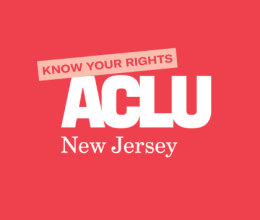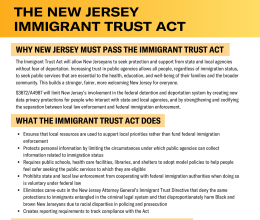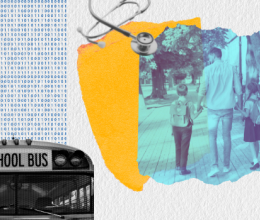
The Excluded New Jerseyans Fund (ENJF) was never funded enough to reach all New Jerseyans excluded from federal pandemic relief, according to a new report by New Jersey Policy Perspective (NJPP).
The ENJF was initially funded with $40 million in federal CARES Act dollars, supplemented with an additional $10 million in American Rescue Plan dollars in December 2021, and then had a majority of its funds — $34 million — reallocated to cover other state expenses.
Even before the fund was cut, the $50 million was only enough to cover 25,000 individuals or 12,500 households, a fraction of those excluded from federal pandemic relief, including the state’s nearly half a million undocumented residents, roughly 300,000 of whom are in the labor force. Despite only reaching a small percentage of those in need of relief, the program is set to expire at the end of the month.
“Even at its full amount, the Excluded New Jerseyans Fund would have fallen short of meeting the needs of communities and families,” said Jon Shure, Interim President and founder of NJPP. “The goal needs to be helping all families get the support they need to make it through this unprecedented crisis.”
The report, Recovery for All: Excluded New Jerseyans Fund Falls Short, also finds that the maximum benefit of the ENJF — $2,000 for individuals and $4,000 max per household — pales in comparison to aid provided to others facing financial hardship due to the COVID-19 pandemic. An unemployed New Jersey resident who was eligible for unemployment insurance and was unemployed for the average (mean) duration of unemployment (currently 29 weeks) was eligible for a minimum of $12,380 and an average of $21,738 in unemployment insurance.
Beyond unemployment insurance, residents with a Social Security number were also eligible to receive up to $3,200, and $2,500 per child, in direct stimulus payments if they met income thresholds established by the CARES Act and American Rescue Plan.
“The Excluded New Jerseyans Fund marks an important first step in recognizing that all communities were hurt by the pandemic, even those ineligible for federal relief,” said Nicole Rodriguez, NJPP Research Director and report author. “This is a vital program, and the Murphy administration deserves credit for setting it up, but it’s clear that the fund needs a boost to meet its stated goal of assisting those who have gone almost two years without relief.”
The ENJF, intended to aid those facing financial hardship who were excluded from federal pandemic relief, was established by the Murphy administration in May 2021 in response to advocacy and organizing led by immigrant community members and a lack of legislative action. Similar programs exist in other states, including New York, Washington, Colorado, Oregon, Illinois, and dozens of municipalities across the country.
“For over two years, immigrant communities have suffered the devastating consequences of the ongoing COVID-19 pandemic without access to vital relief funds. As a result of this lack of access, thousands of immigrant families across the state now face the long-term impacts of economic inequity,” said Alejandra Sorto, Campaign Strategist for ACLU-NJ. “We call on the Murphy administration and the New Jersey Legislature to take immediate action and prioritize relief for the communities most impacted by deep-rooted racial and economic injustice.”
Immigrant community members and advocates have sounded the alarm for months on the need for more funding to raise benefit levels and reach more people, a simpler application process, and additional support for outreach, advertising, and application processing. The ENJF did not have adequate infrastructure to evaluate applications and did not create a robust enough outreach program to reach the hundreds of thousands of eligible individuals across New Jersey. In New York, the state gave out $2.1 billion in aid in less than two months, whereas New Jersey gave out only a tiny fraction of that amount over a longer timeframe.
“We recognize the critical need for the Excluded New Jerseyan Fund and have worked tirelessly to make it a reality for those who need it. Even though the amount first allocated was insufficient, we saw it as an important first step towards providing some relief for families that were hit the hardest throughout this pandemic,” said Kevin Brown, Executive Vice President and New Jersey State Director of 32BJ. “We regret the systems put in place were inadequate, inefficient, poorly administered, and hope to see a swift, positive resolution to these issues. Money needs to get into the hands of New Jersey’s working families as soon as possible for those who need it.”
The report recommends that New Jersey lawmakers improve the ENJF with higher benefits and enough funding to reach more residents, highlighting neighboring New York’s federally funded Excluded Workers Fund where eligible residents could receive up to $15,600 per person. The report also lifts up Washington State’s COVID-19 Immigrant Relief Fund as an example of a comparable program funded with state dollars.
“The original decision to exclude noncitizens from federal pandemic relief is a relic of the Trump administration, one of the most hateful and regressive regimes of our lifetime,” said Amy Torres with New Jersey Alliance for Immigrant Justice. “We applaud NJPP’s report for validating what community members have said all along: New Jersey can and must do more to deliver a recovery for all.”




